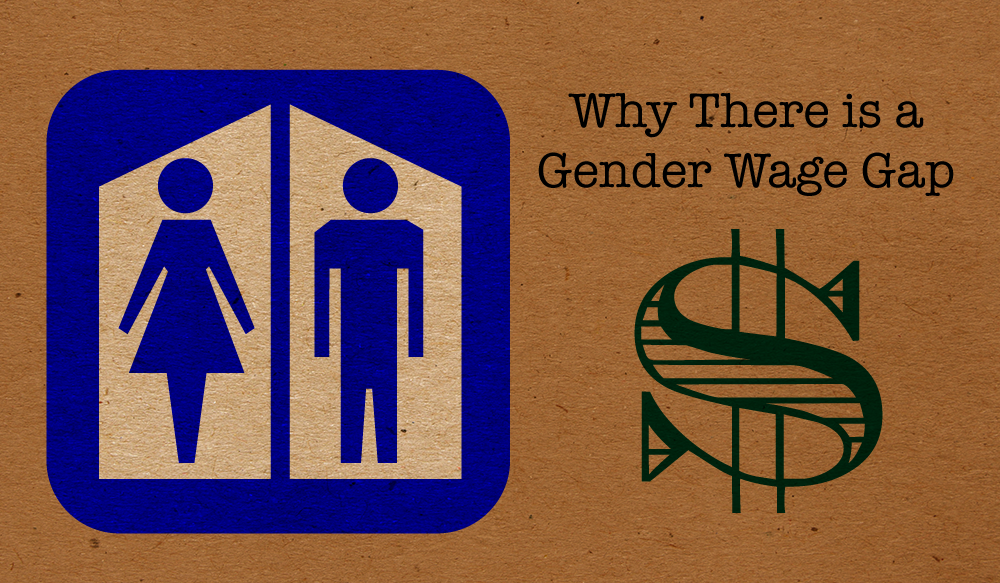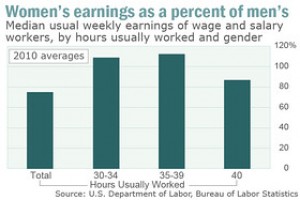
We have all heard the talking points. “men make 20% more then women”. This seems plausible. American business was male dominated until the Women’s Lib movement in the 1960’s. Women entering the workforce at the time had a great many obstacles to overcome, and it seems logical that they still face some obstacles 50 years later. But do they? Let’s take a look at why there is a gender wage gap.
The “wage gap” that we all hear about is based on flawed data. The 20% number is arrived at by calculating end of year tax returns of “full time” employees. It does not take into effect variables such as hours worked, seniority, or career choices.
Different Loyalties
 Full time is defined as over 30 hours per week. If you look at only people who work 40 hours a week, men only make 13% more then women. Conversely, if you look at just people who work between 30 and 34 hours per week, women make 9% more then men.
Full time is defined as over 30 hours per week. If you look at only people who work 40 hours a week, men only make 13% more then women. Conversely, if you look at just people who work between 30 and 34 hours per week, women make 9% more then men.
In many ways, most men build their identity around their jobs. They identify as their job title. They socialize at work. They build their self worth around their career. Many women, on the other hand, tend to separate their lives from their work. Their self worth isn’t dependent on their jobs, and their social circles exist outside their work life.
I don’t think one way is necessarily better then the other, but I do think the difference in the ways of thinking affects wages.
Different Interests
The next problem with the “wage gap” myth is that it lumps all workers together, regardless of vocation. It says “that male engineer makes more then that female social worker, and that isn’t fair”.
The top 10 Masters Degrees earned by men in the 2011-2012 year were:
- Business Administration and Management
- Electrical, Electronics and Communications Engineering
- Educational Leadership and Administration
- Business/Commerce
- Education
- Accounting
- Public Administration
- Computer Science
- Mechanical Engineering
- Computer and Information Sciences
The top 10 Masters Degrees earned by women in the 2011-2012 year were:
- Business Administration and Management
- Education
- Social Work
- Elementary Education and Teaching
- Curriculum and Instruction
- Educational Leadership and Administration
- Special Education and Teaching
- Counselor Education/School Counseling
- Nursing (RN, ASN, BSN, MSN)
- Reading Teacher Education
The top 10 paying jobs for masters degrees according to Monster.com are:
- Electrical Engineering
- Finance
- Chemical Engineering
- Economics
- Physics
- Computer Science
- Mechanical Engineering
- Civil Engineering
- Physician Assistant Studies
- Information Systems
The 5 worst paying Master’s Degree’s according to the same article are:
- Counseling
- Social Work
- Music
- Library and Information Science
- Education
 Does anyone else see the correlation here? 8 of the top 10 Master’s Degree programs chosen by women fall into the bottom 5 paying jobs you can get with a Master’s Degree. Meanwhile, 8 of the top Master’s Degree’s that men study for fall in the top 10 paying master’s degree’s.
Does anyone else see the correlation here? 8 of the top 10 Master’s Degree programs chosen by women fall into the bottom 5 paying jobs you can get with a Master’s Degree. Meanwhile, 8 of the top Master’s Degree’s that men study for fall in the top 10 paying master’s degree’s.
Saying that the wage gap is unfair, and women deserve to be paid the same as men, is the same as saying a social worker (average pay $56,900 per year) deserves to paid the same as a mechanical engineer (average pay $105,000 per year).
Different Priorities
These statistics alone make up for the 30% “gender wage gap” everyone keeps talking about, but there are still more things that contribute. 43% of women leave their jobs to spend time raising their children, and then come back into the workforce at a later date. This disrupts seniority. It is very simple. If a person works at a job for 10 years, then quits for 5 years to raise a child from birth until they enter school, then returns to the workforce, they are starting with 15 years less seniority then someone who stayed at the same job. That is 15 years worth of raises that they did not get. Why would someone think that an accountant should be making the same as a different accountant with 15 years seniority over them?
So why is their a Gender Wage Gap?
The reality of why there is a gender wage gap is women choose to pursue less lucrative careers, they choose to work less hours, and they choose to prioritize things other then their careers. Women are not being discriminated against. There is no misogynistic conspiracy to keep women down. Women just have different priorities, different interests, and different loyalties then men. Neither is right or wrong, it is just what makes us unique.






